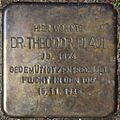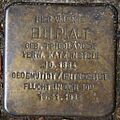Richard Plant (writer) facts for kids
Richard Plant (born July 22, 1910 – died March 3, 1998) was a writer and professor. He was born in Germany. Because of the Nazis, he had to leave his home country. He moved first to Switzerland and then to the United States.
In the U.S., he became a professor at the City University of New York. He taught German language and literature from 1947 to 1973. Plant wrote many books, both fiction and non-fiction. His most famous book was The Pink Triangle: The Nazi War Against Homosexuals (1986). This book explained how gay people were treated badly by the Nazis.
Contents
Richard Plant's Early Life in Germany (1910–1933)
Richard Plant was born as Richard Plaut in Frankfurt, Germany. His parents were Meta and Theodor Plaut. His father was a doctor and a city council member. Richard's family was Jewish, but they did not strictly follow religious rules. His grandfather, Dr. Rudolf Plaut, was a Reform rabbi.
Richard's godfather was Kurt Goldstein, a professor of neurology. Goldstein helped Richard with his stuttering.
After high school, Richard went to the University of Frankfurt in 1929. He studied German literature and European history. At the university, he met Oskar Koplowitz, who became a lifelong friend. They later moved from Germany together. Richard was very interested in literature, theater, and movies. He wrote film reviews for a newspaper called Frankfurter Rundschau. He also worked as an extra in plays.
In 1930, Richard briefly moved to Berlin and studied at the University of Berlin. He continued to write about culture and worked as an extra in movies, including The Threepenny Opera. In Berlin, he met Klaus Mann, a writer whose books he admired.
Richard returned to the University of Frankfurt in 1931. At this time, the Nazi Students League started to cause trouble in classes taught by Jewish professors. Richard wanted to write his doctoral paper on a popular novelist, but his professor said no. So, he decided to move to Basel, Switzerland.
Moving to Switzerland for Studies (1933–1938)
On February 28, 1933, Richard Plaut left Germany for Switzerland. His friend Koplowitz joined him a few months later. They thought their move would be temporary. They hoped to return to Frankfurt once the Nazis were no longer in power.
Richard's father was arrested in February 1933 because he was a socialist. He was soon released. Richard's parents then moved to California, where they had family. However, his mother was sick and wanted to spend her last days in Germany. So, they returned to Frankfurt, where she died in 1934. Richard's father remarried and decided to stay in Germany, thinking he would be safe. Sadly, Theodor and Elli Plaut died shortly after the Kristallnacht in November 1938.
In Switzerland, Richard and Koplowitz studied at the University of Basel. They did not have much money. They also had student visas, which limited their work options. So, they earned money by writing. They teamed up with another friend, Dieter Cunz, and wrote three successful detective novels together. They used the group pen-name Stefan Brockhoff. These books were even published in Nazi Germany. They are known as pioneers of Swiss crime stories.
Richard also wrote a children's book called Die Kiste mit dem großen S. (1936). It was published in Switzerland and translated into Dutch. He wrote many film reviews for a Basel newspaper. He even used the name Richard Plant for some articles published in German newspapers.
Both Richard and Koplowitz earned their Ph.D. degrees in German literature from Basel. Richard's paper in 1937 was about the writing style of the Austrian author Arthur Schnitzler. After his Ph.D., Richard wrote a small book about cinema called Taschenbuch des Films (1938).
After finishing their studies, their student visas ran out. They could not get work permits or stay in Switzerland permanently. So, Richard, Koplowitz, and Cunz decided to move to the United States. They needed help from family and friends to get there.
Life and Work in New York (1938–1973)
In 1938, Richard arrived in New York City. He changed his name to Richard Rene Plant. His friend Koplowitz changed his name to Seidlin. They wrote an English children's book together called S.O.S. Geneva. It was about peace and was published just before World War II started.
Plant connected with other German people who had moved to New York. From 1941 to 1942, he worked for Klaus Mann as an editor for an anti-Nazi magazine called Decision. He also worked for Siegfried Kracauer. When the U.S. entered World War II, Plant found full-time work. For three years, he wrote scripts, translated, and broadcast for the U.S. Office of War Information and NBC. He became a U.S. citizen in 1945.
After the war, Plant's friends Seidlin and Cunz became professors at other universities. Plant stayed in New York. In 1947, he was hired by the City College of the City University of New York. He wrote a novel called The Dragon in the Forest (1948), which was partly about his own life growing up in Frankfurt during the rise of the Nazis.
Plant also wrote book reviews for major newspapers and magazines like New York Times and Saturday Review. He edited books for German language students. He became a full professor in 1970. Plant lived in Greenwich Village, a neighborhood in New York City. He spent his summer holidays with his friends Seidlin and Cunz in Austria or Massachusetts.
In 1956, Plant published an essay and five short stories under the pen-name Orlando Gibbons in a Swiss magazine. The essay talked about how gay people were treated unfairly during the McCarthy era in the U.S. The stories were happy tales about gay life in New York City. In 1965, an opera called Lizzie Borden premiered. Richard Plant had written the story for this opera, which he considered one of his greatest achievements.
The Pink Triangle Book
After retiring from teaching in 1973, Plant had more time for his own projects. He was inspired by new groups and studies about gay history. He joined a group for older gay people and started his most important writing project. This project was a history of how gay men were treated badly by the Nazis.
As a gay man who had to leave Germany because of the Nazis, this topic was very important to him. His book starts and ends with parts about his own life. For his research, he traveled to Arolsen, Germany. There, he looked at old records from concentration camps.
His major book, The Pink Triangle: The Nazi War Against Homosexuals, was published in 1986. It was translated into German five years later, and Plant went on a successful book tour in Germany. It was also translated into Dutch and Slovenian.
Richard Plant's companion in his later years was Michael Sasse. Richard Plant died in New York City on March 3, 1998. His writings are kept in the New York Public Library.
Images for kids
See also
 In Spanish: Richard Plant para niños
In Spanish: Richard Plant para niños
 | Precious Adams |
 | Lauren Anderson |
 | Janet Collins |




